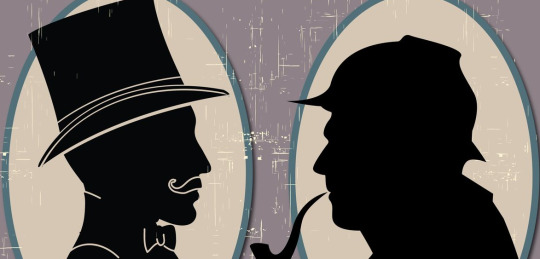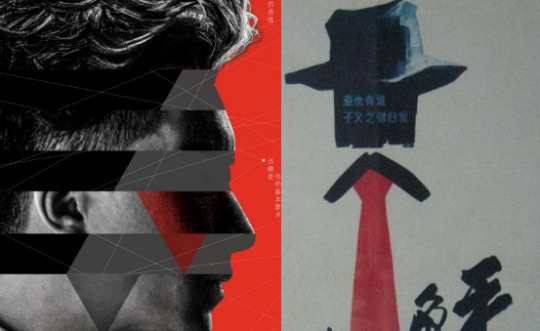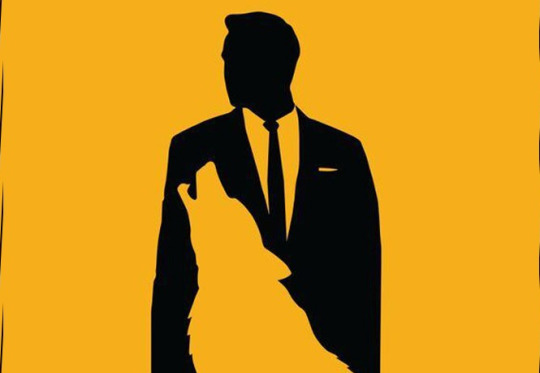#lupinchads can't stop winning
Explore tagged Tumblr posts
Note
May I please ask what your preferred dynamic between Holmes & Lupin would be? (From what I can tell, the term 'frenemies' might have been invented for these two - if any two characters in fiction WOULD spend all their time trying to one-up each other it's these two, if only their diverse other commitments, challenges & interests left them the free time to do so: I'm also morally certain a sadly-hypothetical Holmes/Lupin team is one of the few things that could bring down Fantomas for Good).

I think "frenemies" is what ultimately works best for these two specifically, because there's a certain untouchability to icons as big as these two that limits the potential stories you can tell with them (although yes, definitely on board with the two having what it takes to bring down Fantomas, although probably not as cleanly and easily as they might expect).
The original Leblanc stories involving this premise are very much centered around one-upmanship, even embracing a theme of national rivalry of England vs France. They acknowledge Holmes's talents but without the awe, with a somewhat aged Holmes with mundane imperfections easily exploited by the daring young thief, someone deserving of his legend but who doesn't quite live up to it. Obviously Lupin's gotta have the upperhand, not just because it's his author writing it, but because the whole point of Lupin's creation was to be the new hotness, the counterpart to both the stuffy old Great Detectives as well as the aristocratic master burglars, and really, what kind of rising superstar would he be if he couldn't put one over the other guy? If he's gonna live up to his claim of being the greatest criminal ever, he's gotta be able to humble the greatest detective at least a little.
The treatment of Watson (Wilson) is tasteless and it's frankly a bit saddening to see that even back then writers were still shitting on Watson far too much, but on the whole I think Leblanc was a lot fairer to Holmes than he could have been (certainly other writers from this time period who added Holmes to their stories were not as fair), he makes it very clear Holmes is not just another Ganimard out of his depth and is very much as close to an equal Lupin's ever had. I think the description used to cap off their final meeting is very much on point:
"You see, monsieur, whatever we may do, we will never be on the same side. You are on one side of the fence; I am on the other. We can exchange greetings, shake hands, converse a moment, but the fence is always there.
You will remain Herlock Sholmes, detective, and I, Arsène Lupin, gentleman-burglar. And Herlock Sholmes will ever obey, more or less spontaneously, with more or less propriety, his instinct as a detective, which is to pursue the burglar and run him down, if possible.
And Arsène Lupin, in obedience to his burglarious instinct, will always be occupied in avoiding the reach of the detective, and making sport of the detective, if he can do it. And, this time, he can do it" - Arsene Lupin vs Herlock Sholmes
The consistent outcome is that Holmes "wins" the material battle while Lupin gets away with the spiritual or karmic victory. The first story, Holmes has Lupin figured out from a glance, robbing him of his greatest asset, and Lupin even tells Holmes under a guise that he has no greater admirer than himself. Holmes choses not to arrest Lupin, and instead solves the mystery as quickly as Lupin would. But he is also, well, inferior. His "commonplace appearence" dissappoints the guests and detectives at the crime scene, he doesn't resemble their expectations, he is gruff, ungracious, arrogant and all-business, an Englishman all the way, and Lupin one-ups him by returning to him his stolen watch, and Holmes is not a good sport about it.
The whole "Herlock Sholmes" name change, although it was out of legal obligation, almost reads like a cheeky courtesy of Leblanc, like he's giving Holmes enough of a courtesy in sparing him the embarassment of being the loser. And the following adventures stay consistent: Sholmes is smart, as smart as Lupin, and he's a gentleman. But he isn't as smart as he thinks he is, and he isn't as much of a gentleman as Lupin. He resorts to unsporting tactics like intimidating Lupin's lover and involving the police in their conflict, and in the end, he's solved the crime, but "sown the seeds of discord" in a family Lupin was protecting, becoming the villain for a change, a role reversion Lupin openly laughs at. Holmes wins the "loot", he wins the material battle, but Lupin has the last laugh, and despite being a self-proclaimed villain, Lupin gets the moral victory.
It's a quite unflattering view of Holmes and one perhaps not suited for a crossover outside of the specific context of Holmes being the old and stuffy intruder in an Arsene Lupin story. Then again, every great hero needs a lesson in humility every now and then.
There's a particularly interesting variant of this dynamic to be found within China's own takes on Sherlock Holmes and Arsene Lupin.

Sherlock Holmes was quite the breakout hit for Chinese audiences at the time of his release, revered as an alternative to Judge Bao and the court-case novels. It's estimated that from 1903 to 1909, detective fiction constituted over almost 50% percent of all Western translated fiction, and with Holmes followed others like Nick Carter and Charlie Chan, and then Arsene Lupin, and soon their own local versions. The most famous and popular of which was Huo Sang, created by Cheng Xiaoqing, who was one of the main translators for Conan Doyle's stories. Cheng Xiaoqing even wrote his own take on Sherlock Holmes vs Arsene Lupin called "The Diamond Necklace", intending on correcting Leblanc's take, although interestingly, he unintentionally recreates the exact outcome by giving Holmes an unsporting attitude, where he "wins" only because Lupin lets him, and Lupin gets away again with the moral high ground. He would fare off much better in correcting Holmes with his own character, Huo Sang.
Huo Sang has a lot of similarities to Holmes, even with his own Watson counterpart, but was also designed to represent a few more traditional Chinese values. He is a science teacher with no addictions who belittles the wealthy class and fights for the poor, and he is praised for humility, one story even making a point to criticize Holmes for arrogance. He is a very Westernized character, with suits and guns and cigarettes galore, but the books were very dictatic and the author marketed them as "disguised textbooks for science", playing up on a newfound social reverence to scientific methods and self-improvement and national rejuvenation.
The stories deal heavily with corruption of the police force and institutions. In the earlier stories he outright calls police detectives useless rice buckets only good for solving petty thefts and preying on those that can't defend themselves, and while they become less sinister in later stories, Huo Sang's relation with law enforcement is much more frayed than Holmes's own. He uses dirty police tactics of his own and sometimes takes the law into his own hands, thinking the law cannot possibly achieve justice on it's own. His biggest loyalty is to his country and he values his reputation above all else. He values justice more than the law, like Holmes. But like Holmes, he still prefers to work inside the law and within Chinese traditions.
"Bao Lang, you scholar, you're too idealistic. Don't you realize how weak the law is in modern society? Privilege and power, favors and money - the law has all these deadly enemies
"We investigate half to slake our thirst for knowledge, half out of duty to serve and uphold justice. In the realm of justice, we are never constrained by the wooden and unfeeling law. For in this society, which is gradually tending to surrender its core to material things, the spirit of the rule of law cannot be put into general practice, and the weak and ordinary people are aggrieved, more often than not unable to enjoy the protection of the law.

Lu Ping, as you'd expect from a counterpart to Lupin, was much different. In fact, right in his very first story, he was already pitted against Huo Sang and outsmarting him, in a story called "Wooden Puppet Play". The character is inspired by an already existing tradition within Chinese literature of the "chivalrous thief", shapeshifting masters of deception and martial arts, and considered admirable and benevolent opposite to the corrupt government officials they outwit.
His stories are more whimsical, energized, more varied, less dedicated to strict science. He whistles while committing crimes, is identifiable by a red tie and wooden puppets he uses to signal his goons on what outfit he's gonna be wearing, and even cracks asides to the reader. In many aspects Lu Ping is influenced by hard-boiled Western detective stories, and naturally, he has a much more contemptious view of the law than Huo Sang
Well then, was he willing, in his capacity as thief, to represent the sanctity of the law and catch the murderer? Yes, he would be quite happy to round up that murderer. But he wasn't at all willing to boost the reputation of the law. He'd always felt that the law was only something like an amulet that certain smart guys had fabricated to get them out of embarassing situations.
Such an amulet migh be good for scaring away idiots, but it oculdn't threaten the violent, crafty and arrogant evil ones. Not only could it not scare them away, a lot of them hid right behind it to work their evil tricks!
Conflicts between these two are not just rooted in one-upsmanship or the patriotic conflict between the two, but instead in two differing approaches to justice, their influence on fellow Chinese writers to step outside tradition, and the respective ways they address issues in society. Additionally, it's not just a conflict between Great Detective vs Gentleman Villain, but the Holmesian Detective and the Hardboiled Detective. And, naturally, when the two met, a pattern reocurred again.
Writing a Lu Ping tale in his usual manner, Sun Liaohong deprives the detective of the advantage he typically enjoys at the hand of Cheng Xiaoqing or any other follower of Conan Doyle - narration by the detective's coadjutor.
It is Huo Sang who slinks around like a thief, alarming hotel service personnel. He becomes rattled, and even so is vain and arrogant. He is a bit too positivist about searching for clues, and he spends a remarkable amount of time just relaxing and waiting for something to happen.
The figure of "wooden puppets" turns wicked when the author uses the term to refer to Huo Sang, Bao Lang, and the police. Satirizing the genre as a play in which the author woodenly manipulates his character. But Lu Ping as puppet is a genius, moving from one identity to another, whereas Huo Sang is a dumbbell - wooden indeed, bourgeois, ridiculed.
A gentleman's agreement occurs only at the end. Huo Sang has the formal victory. He frees Lu Ping in order to get the paining, but the exhibition is held a day late and it now bears Lu Ping's seal.
In wartime, peace talks, diplomacy and gentlemen's agreements are just smoke screens, the stuff of puppetry. Both Huo Sang and Lu Ping surround themselves with lies to reach their final accomodation. Perhaps they are both puppets - Chinese Justice, the Fiction: Law and Literature in Modern China, by Jeffrey C. Kinkley
Both characters were canned in 1949 when the CCP banned detective fiction, and it was replaced with anti-spy literature about how the party police would expose counterrevolutionary conspiracies. They never got to have a rematch, and to my understanding there were a couple of films made afterwards about them, Huo Sang had a very recent one in 2019, but never another meeting.
I guess the takeaway here time and time again is that, credit to Holmes and all, but:

#replies tag#pulp heroes#pulp fiction#sherlock holmes#herlock sholmes#arthur conan doyle#arsene lupin#maurice leblanc#lupinchads can't stop winning
92 notes
·
View notes